英语阅读理解之主旨大意题
- 格式:docx
- 大小:22.12 KB
- 文档页数:2
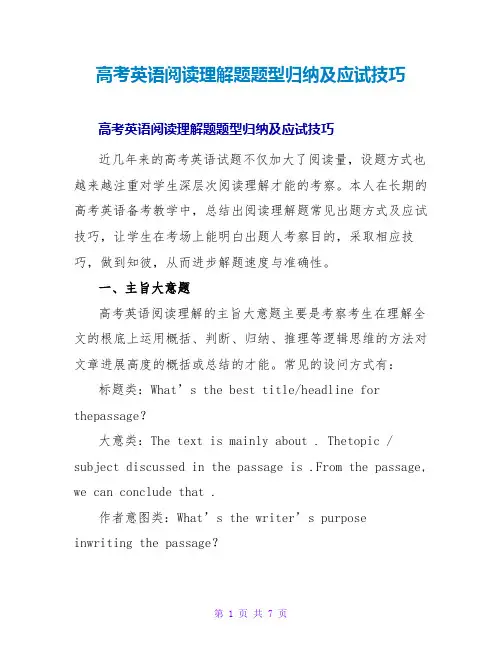
高考英语阅读理解题题型归纳及应试技巧高考英语阅读理解题题型归纳及应试技巧近几年来的高考英语试题不仅加大了阅读量,设题方式也越来越注重对学生深层次阅读理解才能的考察。
本人在长期的高考英语备考教学中,总结出阅读理解题常见出题方式及应试技巧,让学生在考场上能明白出题人考察目的,采取相应技巧,做到知彼,从而进步解题速度与准确性。
一、主旨大意题高考英语阅读理解的主旨大意题主要是考察考生在理解全文的根底上运用概括、判断、归纳、推理等逻辑思维的方法对文章进展高度的概括或总结的才能。
常见的设问方式有:标题类:W hat’s the best title/headline for thepassage?大意类:The text is mainly about . Thetopic / subject discussed in the passage is .From the passage, we can conclude that .作者意图类:What’s the writer’s purposeinwriting the passage?针对主旨大意类型的题,考生可以掌握以下解题策略:把握文章逻辑构造,快速找出主题;寻找主题句,确定文章中心思想;将首段中心句和各段第一句话连接成一个整体,得出文章主题;逆向思维法解标题类问题。
此类题关键在于通读全文,理解作者写作意图,不受干扰项细节影响,要把握好文章的大意,抓住文章的主题句,还应注意文章的体裁及写作目的。
二、数据推断题解答此类题,关键是要擅长捕捉有关数字的信息,然后在透彻理解原文的字面意义和题意的根底上,运用自己的数学知识,分列数字,对其进展分析^p 、推算,从而得出正确的结论。
如阅读理解题:……But now there is a Winter-swimmingEnthusiasts’Club and it has more than 2.000 mem.bers. The oldest is 84 years old and the youngest isonly 7. The members are from all walks oflife ……The question is : Among the winter-swimmersthe oldest is _____ years older than the youngestone.A. 91B. 84 C . 77 D. 7答案是C。
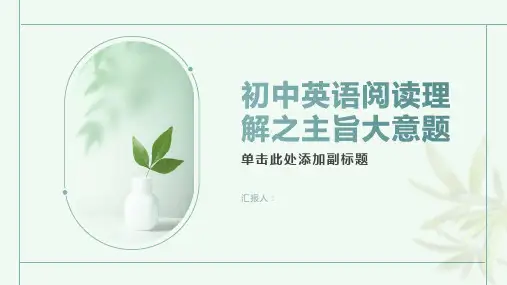
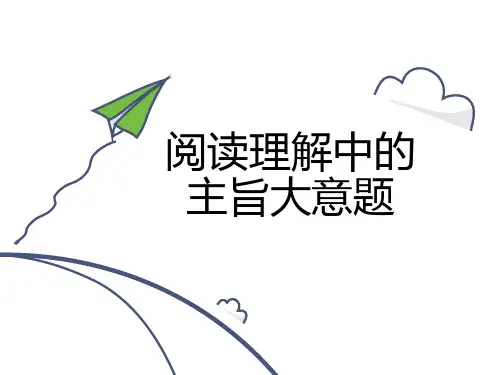
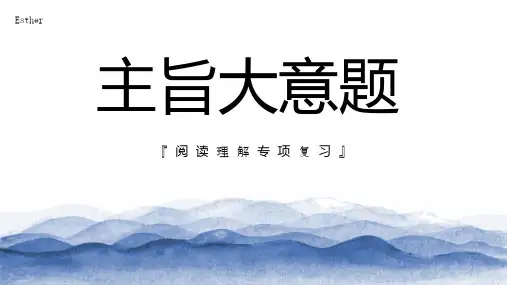
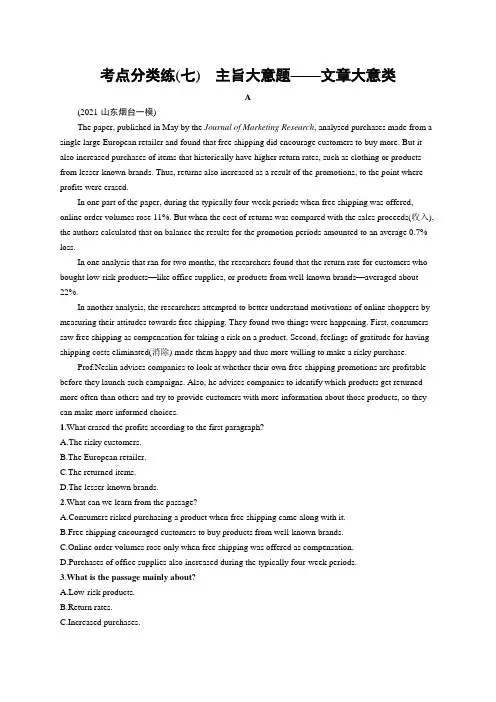
考点分类练(七)主旨大意题——文章大意类A(2021·山东烟台一模)The paper, published in May by the Journal of Marketing Research, analysed purchases made from a single large European retailer and found that free shipping did encourage customers to buy more. But it also increased purchases of items that historically have higher return rates, such as clothing or products from lesser-known brands. Thus, returns also increased as a result of the promotions, to the point where profits were erased.In one part of the paper, during the typically four-week periods when free shipping was offered, online order volumes rose 11%. But when the cost of returns was compared with the sales proceeds(收入), the authors calculated that on balance the results for the promotion periods amounted to an average 0.7% loss.In one analysis that ran for two months, the researchers found that the return rate for customers who bought low-risk products—like office supplies, or products from well-known brands—averaged about 22%.In another analysis, the researchers attempted to better understand motivations of online shoppers by measuring their attitudes towards free shipping. They found two things were happening. First, consumers saw free shipping as compensation for taking a risk on a product. Second, feelings of gratitude for having shipping costs eliminated(消除) made them happy and thus more willing to make a risky purchase.Prof.Neslin advises companies to look at whether their own free-shipping promotions are profitable before they launch such campaigns. Also, he advises companies to identify which products get returned more often than others and try to provide customers with more information about those products, so they can make more informed choices.1.What erased the profits according to the first paragraph?A.The risky customers.B.The European retailer.C.The returned items.D.The lesser-known brands.2.What can we learn from the passage?A.Consumers risked purchasing a product when free shipping came along with it.B.Free shipping encouraged customers to buy products from well-known brands.C.Online order volumes rose only when free shipping was offered as compensation.D.Purchases of office supplies also increased during the typically four-week periods.3.What is the passage mainly about?A.Low-risk products.B.Return rates.C.Increased purchases.D.Free shipping.B(2021·湖北黄冈高三4月模拟)An advance in electronic publishing could make the e-book you are reading seem as dated as a silent film. Publishers hope to explore the growing success of e-books by releasing versions with added soundtracks(电影原声音乐) and musical accompaniments.The noise in the first multimedia books—released in Britain—include the rain hitting a window in a Sherlock Holmes tale. When the plot of a book reaches the most exciting part, background scores will create tension.Supporters argue that sound effects are the next logical development for e-books and will add excitement for younger readers. Critics, however, will argue that the noise will ruin the simple pleasure of having the imagination stimulated by reading.Caroline Michel, chief executive of the literary agency, said the new generation of computer-literate readers was used to multiple sensory input. She said,“Young people have split computer screens where they may be watching television and replying to an email at the same time. If that’s what the market wants then we should respond to the market.”Booktrack’s sound effects work by estimating the user’s reading speed. Each time you “turn” a page, the software reassesses where you have reached in the text and times the sounds to switch on accordingly. If the soundtrack becomes out of sync(同步), a click on any word will reset it.Some authors fear that a soundtrack could destroy the peace and quiet of libraries and ruin the pleasure of reading. David Nicholls, author of Our Day, the best-seller now released as a film, said, “This sounds like the opposite of reading. I have enough trouble reading an e-book because I’m constantly distracted by emails.”Stuart MacBride sells 18% of his books as electronic downloads. He said,“If I’m reading, I will do the noise in my head. I don’t need someone to tell me what teacups clinking sounds like. That would irritate me.”4.What do publishers expect an e-book soundtrack to do?A.Help to release an e-book as a film.B.Help readers improve reading speed.C.Add tension at a book’s exciting point.D.Get readers familiar with the background.5.Who is in favour of added soundtracks for e-books?A.Sherlock Holmes.B.Caroline Michel.C.David Nicholls.D.Stuart MacBride.6.What do we know about Stuart MacBride?A.He was a person who was easy to get angry.B.He knew a great deal of tea.C.Eighty-two percent of his books described crime.D.He imagined sounds related to the story when reading.7.What’s the main idea of the passage?A.Opinions about e-books with soundtracks.B.Response to the need of the book market.C.Reasons for traditional e-books becoming outdated.D.Suggestions on encouraging readers’ imagination.C(2021·湖南长郡十五校高三联考)For most people, graduation is an exciting day of the celebration of years of hard work. My graduation day was not.I remember that weekend two years ago. Family and friends had flown in from across the country to attend the celebration. But just like everyone else in my class, I had watched the economy turn from bad to worse. What I thought would take a week dragged into two, and then four, and 100 job applications later, I found myself in the exact same spot as I was before. And the due date to begin paying back my student loan was drawing closer.You know that feeling when you wake up in fear? That feeling became a constant in my life. Days felt like weeks, weeks like months. And the most frustrating part was no matter how much I tried, I just couldn’t seem to make any progress.So what did I do to maintain my sanity(理智)? I decided to write. Something about putting words on a page made everything seem a little clearer—a little brighter. Something about writing gave me hope. And if you want something badly enough, sometimes a little hope is all you need! So I put my thoughts into a children’s book. And then one day, without any sort of writing degree or contacts in the writing world—just a lot of hard work and perseverance—I was offered a publishing contract for my first book! After that, things slowly began to fall into place. I was offered a second book deal. Then, a few months later, I got an interview and was hired shortly.The moral of this story is... don’t give up. Even if things look bleak now, don’t give up. If you work hard, things will always get better. Oftentimes all we need is the courage to overcome difficulties.8.From paragraph 2, we can learn that the author probably .A.was having an exciting graduationB.was getting into financial difficultiesC.missed the life in the universityD.had just applied for the student loan9.How did the author change the frustrating situation?A.By sending applications.B.By offering contracts.C.By keeping writing.D.By publishing books.10.Which of the following can replace the underlined word “bleak” in the last paragraph?A.Unattractive.B.Hopeless.C.Thrilling.D.Promising.11.What is the passage mainly about?A.Success belongs to the persevering.B.A contented mind is a permanent feast.C.A smooth sea never makes a skillful mariner.D.Misfortunes tell us what fortune is.考点分类练(七)主旨大意题——文章大意类【语篇导读】本文是一篇说明文。
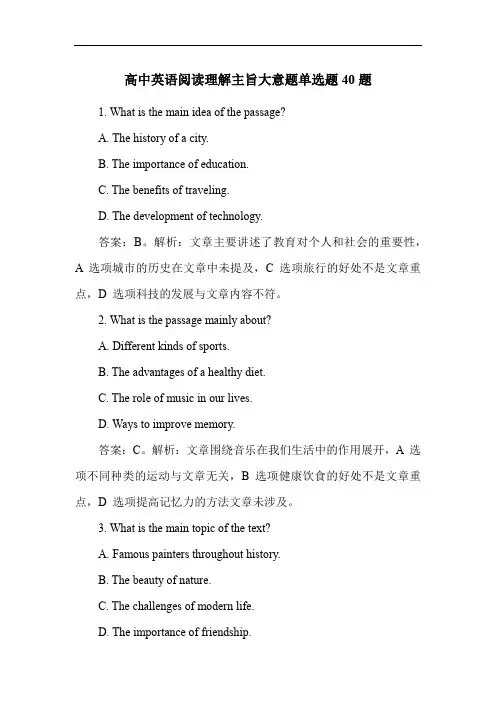
高中英语阅读理解主旨大意题单选题40题1. What is the main idea of the passage?A. The history of a city.B. The importance of education.C. The benefits of traveling.D. The development of technology.答案:B。
解析:文章主要讲述了教育对个人和社会的重要性,A 选项城市的历史在文章中未提及,C 选项旅行的好处不是文章重点,D 选项科技的发展与文章内容不符。
2. What is the passage mainly about?A. Different kinds of sports.B. The advantages of a healthy diet.C. The role of music in our lives.D. Ways to improve memory.答案:C。
解析:文章围绕音乐在我们生活中的作用展开,A 选项不同种类的运动与文章无关,B 选项健康饮食的好处不是文章重点,D 选项提高记忆力的方法文章未涉及。
3. What is the main topic of the text?A. Famous painters throughout history.B. The beauty of nature.C. The challenges of modern life.D. The importance of friendship.答案:D。
解析:文章主要探讨了友谊的重要性,A 选项历史上的著名画家文章未提及,B 选项自然之美不是文章核心,C 选项现代生活的挑战不是文章主题。
4. What is the main purpose of the passage?A. To introduce a new product.B. To discuss environmental issues.C. To tell a story about a hero.D. To explain a scientific concept.答案:B。
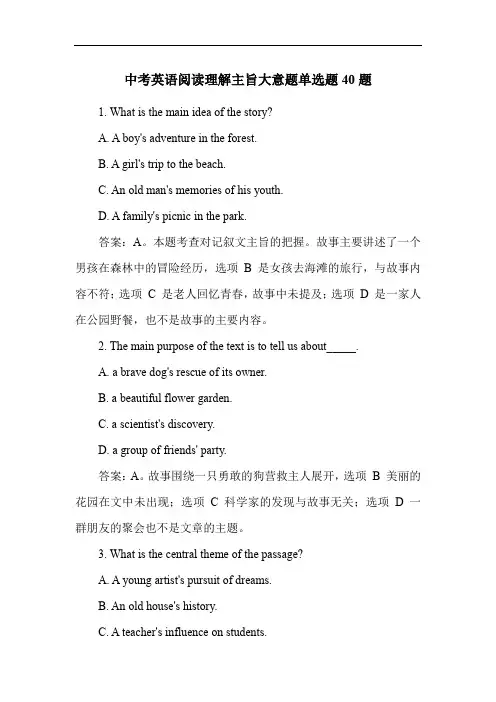
中考英语阅读理解主旨大意题单选题40题1. What is the main idea of the story?A. A boy's adventure in the forest.B. A girl's trip to the beach.C. An old man's memories of his youth.D. A family's picnic in the park.答案:A。
本题考查对记叙文主旨的把握。
故事主要讲述了一个男孩在森林中的冒险经历,选项B 是女孩去海滩的旅行,与故事内容不符;选项C 是老人回忆青春,故事中未提及;选项D 是一家人在公园野餐,也不是故事的主要内容。
2. The main purpose of the text is to tell us about_____.A. a brave dog's rescue of its owner.B. a beautiful flower garden.C. a scientist's discovery.D. a group of friends' party.答案:A。
故事围绕一只勇敢的狗营救主人展开,选项B 美丽的花园在文中未出现;选项 C 科学家的发现与故事无关;选项 D 一群朋友的聚会也不是文章的主题。
3. What is the central theme of the passage?A. A young artist's pursuit of dreams.B. An old house's history.C. A teacher's influence on students.D. A sports game between two teams.答案:A。
文章主要讲述了一位年轻艺术家追求梦想的过程,选项 B 老房子的历史不是重点;选项 C 老师对学生的影响文中未体现;选项D 两队之间的体育比赛与文章内容不符。
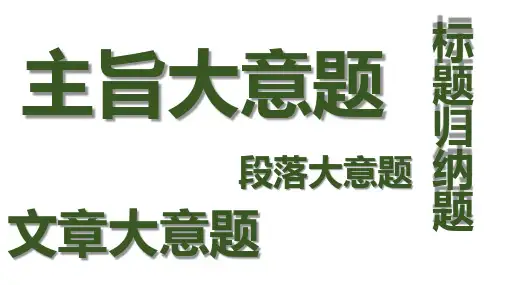
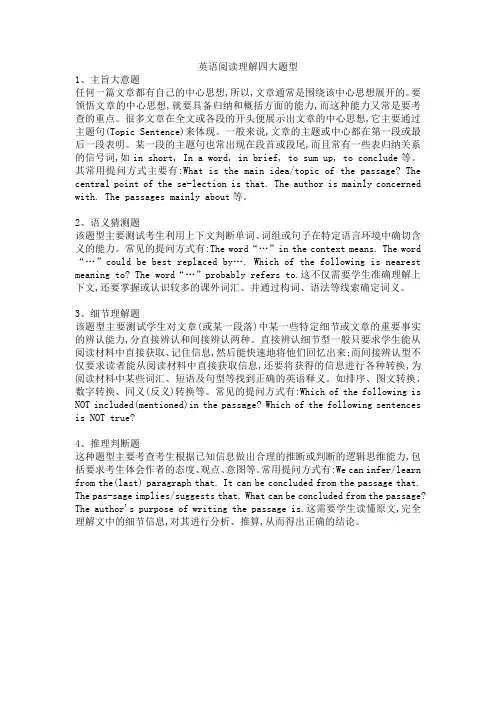
英语阅读理解四大题型1、主旨大意题任何一篇文章都有自己的中心思想,所以,文章通常是围绕该中心思想展开的。
要领悟文章的中心思想,就要具备归纳和概括方面的能力,而这种能力又常是要考查的重点。
很多文章在全文或各段的开头便展示出文章的中心思想,它主要通过主题句(Topic Sentence)来体现。
一般来说,文章的主题或中心都在第一段或最后一段表明。
某一段的主题句也常出现在段首或段尾,而且常有一些表归纳关系的信号词,如in short, In a word, in brief, to sum up, to conclude等。
其常用提问方式主要有:What is the main idea/topic of the passage? The central point of the se-lection is that. The author is mainly concerned with. The passages mainly about等。
2、语义猜测题该题型主要测试考生利用上下文判断单词、词组或句子在特定语言环境中确切含义的能力。
常见的提问方式有:The word“…”in the context means. The word “…”could be best replaced by…. Which of the following is nearest meaning to? The word“…”probably refers to.这不仅需要学生准确理解上下文,还要掌握或认识较多的课外词汇。
并通过构词、语法等线索确定词义。
3、细节理解题该题型主要测试学生对文章(或某一段落)中某一些特定细节或文章的重要事实的辨认能力,分直接辨认和间接辨认两种。
直接辨认细节型一般只要求学生能从阅读材料中直接获取、记住信息,然后能快速地将他们回忆出来;而间接辨认型不仅要求读者能从阅读材料中直接获取信息,还要将获得的信息进行各种转换,为阅读材料中某些词汇、短语及句型等找到正确的英语释义。

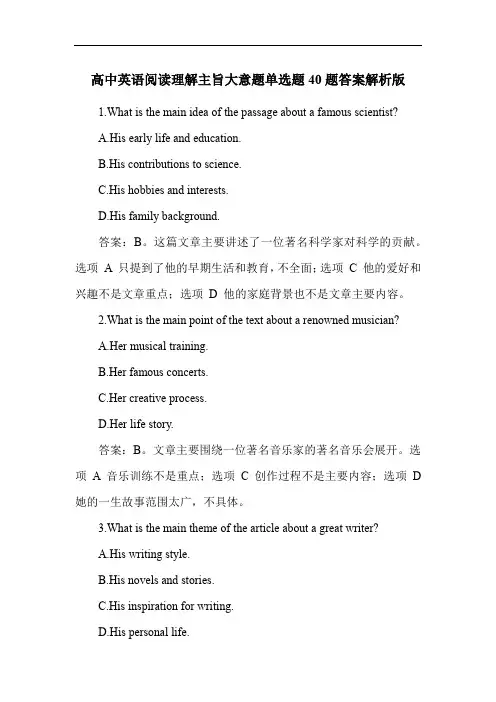
高中英语阅读理解主旨大意题单选题40题答案解析版1.What is the main idea of the passage about a famous scientist?A.His early life and education.B.His contributions to science.C.His hobbies and interests.D.His family background.答案:B。
这篇文章主要讲述了一位著名科学家对科学的贡献。
选项 A 只提到了他的早期生活和教育,不全面;选项C 他的爱好和兴趣不是文章重点;选项D 他的家庭背景也不是文章主要内容。
2.What is the main point of the text about a renowned musician?A.Her musical training.B.Her famous concerts.C.Her creative process.D.Her life story.答案:B。
文章主要围绕一位著名音乐家的著名音乐会展开。
选项 A 音乐训练不是重点;选项 C 创作过程不是主要内容;选项 D 她的一生故事范围太广,不具体。
3.What is the main theme of the article about a great writer?A.His writing style.B.His novels and stories.C.His inspiration for writing.D.His personal life.答案:B。
文章重点是这位伟大作家的小说和故事。
选项A 写作风格不是主旨;选项C 写作灵感不是主要内容;选项D 个人生活不是文章重点。
4.What is the central idea of the passage about an outstanding athlete?A.His training methods.B.His achievements in sports.C.His diet and fitness.D.His hobbies outside sports.答案:B。
中考英语阅读理解主旨大意题单选题40题1.John had a great adventure in the forest. What is the main idea of the story?A.John lost his way in the forest.B.John found many beautiful flowers in the forest.C.John had an exciting adventure in the forest.D.John was scared in the forest.答案:C。
解析:文章主要讲述了John 在森林里的一次大冒险,A 选项只强调了迷路,不是主要内容;B 选项找到美丽的花只是冒险中的一部分,不是主旨;D 选项只说害怕,不全面。
C 选项概括了整个故事的主旨。
2.Mary helped an old lady on her way to school. What is the main idea of the passage?A.Mary was late for school.B.Mary is a kind girl.C.Mary met an old lady.D.Mary had a busy day.答案:B。
解析:文章通过Mary 帮助老人这件事体现了她的善良,A 选项迟到不是主要内容;C 选项遇见老人不是主旨;D 选项忙碌的一天没有体现出重点。
B 选项准确概括了文章主旨。
3.Tom went on a trip with his family. What is the main idea of the story?A.Tom had a lot of fun on the trip.B.Tom's family is very large.C.Tom likes to travel.D.Tom went on a long journey.答案:A。
中考英语阅读理解主旨大意题50题1. What is the main idea of the passage?A. To introduce a famous person.B. To describe a beautiful place.C. To tell a funny story.D. To explain a scientific concept.答案:B。
解析:文章主要内容是对一个美丽地方的描述,A 选项介绍一个名人不符合文章主旨,C 选项讲一个有趣的故事也不恰当,D 选项解释一个科学概念在文章中未体现。
2. The passage is mainly about _.A. a kind of animalB. a special eventC. a popular gameD. a traditional festival答案:D。
解析:文章围绕一个传统节日展开,A 选项一种动物不是文章重点,B 选项一个特殊事件与文章不符,C 选项一个流行游戏也不是文章主要内容。
3. What can we know from the passage?A. The main character is very brave.B. The story happened in a modern city.C. The weather is very good in the story.D. The ending of the story is very sad.答案:A。
解析:文章中能明确体现出主角很勇敢,B 选项故事发生在现代城市文章未提及,C 选项天气情况文章未描述,D 选项故事结局悲伤文章也未体现。
4. The main purpose of the passage is _.A. to teach people how to do somethingB. to make people laughC. to give information about somethingD. to persuade people to do something答案:C。
主旨大意题一、总体解题思路1、宏观上分清文章体裁(记叙文、科普类的说明文议论文)和捋清文章行文脉络二、记叙文:主旨一般在首段和尾段出现(扫读重点关注首尾段各段首尾句或第二句以及转折处句子)第1篇I have a special place in my heart for libraries. I have for as long as I can remember. I wasalways an enthusiastic reader, sometimes reading up to three books a day as a child. Stories were like air to me and while other kids played ball or went to parties, I lived out adventures through the books I checked out from the library.My first job was working at the Ukiah Library when I was 16 years old. It was a dream job and I did everything from shelving books to reading to the children for story time.As I grew older and became a mother, the library took on a new place and an added meaning in my life. I had several children and books were our main source(来源) of entertainment.It was a big deal for us to load up and go to the local library, where my kids could pick out books to read or books they wanted me to read to them.I always read, using different voices, as though I were acting out the stories with my voiceand they loved it !It was a special time to bond with my children and it filled them with the wonderment of books .Now, I see my children taking their children to the library and I love that the excitement of going to the library lives on form generation to generation.As a novelist, l've found a new relationship with libraries. I encourage readers to go to their local library when they can't afford to purchase a book. I see libraries as a safe haven(避风港) for readers and writers, a bridge that helps put together a reader with a book. Libraries, in their own way, help fight book piracy(盗版行为) and I think all writers should support libraries in a significant way when they can. Encourage readers to use the library, Share library announcements on your social media. Frequent them and talk about them when you can. [ 2020全国II卷D篇]首先先快速扫读每段的首尾句或第二句及转折处句子每段有每段的中心句这个中心句可能是全文主旨句也可能只是本段的主旨所以为了更全面把握主旨中心需要每段都要扫读到I have a special place in my heart for libraries. I have for as long as I can remember. I wasalways an enthusiastic reader, sometimes reading up to three books a day as a child. Stories were like air to me and while other kids played ball or went to parties, I lived out adventures through the books I checked out from the library.and an addedsource(来源) ofAs a novelist, l've found a new relationship with libraries. I encourage readers to go to their local library when they can't afford to purchase a book. I see libraries as a safe haven(避风港) for readers and writers, a bridge that helps put together a reader with a book. Libraries, in their own way, help fight book piracy(盗版行为) and I think all writers should support libraries in a significant way when they can. Encourage readers to use the library, Share library announcements on your social media. Frequent them and talk about them when you can. [ 2020全国II卷D篇]既然是记叙文一般就从首尾段找主旨I have a special place in my heart for libraries. I have for as long as I can remember. I wasalways an enthusiastic reader, sometimes reading up to three books a day as a child. Stories were like air to me and while other kids played ball or went to parties, I lived out adventures through the books I checked out from the library.As a novelist, l've found a new relationship with libraries. I encourage readers to go to their local library when they can't afford to purchase a book. I see libraries as a safe haven(避风港) for readers and writers, a bridge that helps put together a reader with a book. Libraries, in their own way, help fight book piracy(盗版行为) and I think all writers should support libraries in a significant way when they can. Encourage readers to use the library, Share library announcements on your social media. Frequent them and talk about them when you can. [ 2020全国II卷D篇]从首尾段提取主题词可以快速缩小选择范围提高准确率即微观上要抓住主题词那么主题词特征有以下几个●反复高频出现●绝大多数以名词为主动词和形容词为辅●出现时往往前有铺垫后有解释说明I和library 就是反复出现高频词并且说的就是I和library的关系优先排除A和B 都属于无中生有显然Young属于偷换概念只有D 和主题词切合并且逻辑关系是呼应的即I和library的关系第2篇Adults understand what it feels like to be flooded with objects. Why do we often assume thatmore is more when it es to kids and their belongings? The good news is that I can help my own kids learn earlier than I did how to live more with less.I found the preholidays a good time to encourage young children to donate lessused things, and it worked. Because of our efforts, our daughter Georgia did decide to donate a large bag of toys to a little girl whose mother was unable to pay for her holiday due to illness. She chose to sell a few larger objects that were less often used when we promised to put the money into her school fund(基金)(our kindergarten daughter is serious about being a doctor)For weeks, I've been thinking of bigger, deeper questions: How do we make it a habit for them? And how do we train ourselves to help them live with, need, and use less? Yesterday, I sat with my son, Shepherd, determined to test my own theory on this. I decided to play with him with only one toy for as long as it would keep his interest. I expected that one toy would keep his attention for about five minutes, ten minutes, max. I chose a red rubber ballsimple, universally available. We passed it, he tried to put it in his mouth, he tried bouncing it, rolling it, sitting on it, throwing it. It was totally, pletely enough for him. Before I knew it an hour had passed and it was time to move on to lunch.We both became absorbed in the simplicity of playing together. He had my full attention and I had his. My little experiment to find joy in a single object worked for both of us.[ 2018全国III卷D ]首先先快速扫读每段的首尾句或第二句及转折处句子(每段有每段的中心句这个中心句可能是全文主旨句也可能只是本段的主旨所以为了更全面把握主旨中心需要每段都要扫读到)Adults understand what it feels like to be flooded with objects. Why do we often assume that提取首尾段首先排除A 和D 显然文中没有提及属于无中生有文中是帮助孩子学习而B的向孩子学习显然属于颠倒逻辑答案C就是直接来自首段尾句其实当文章自问自答或者提出了问题那么后面的回答就是文章的主题三、科普类文章:主旨一般与研究结果或专家建议观点紧密相关快速扫读每段的首尾句或第二句及转折处句子寻找观点结论第3篇We've all been there: in a lift, in line at the bank or on an airplane, around by people who are, like us, deeply look at their smartphones or, worse, fighting with the unfortable silence.What's the problem? It's more likely that none of us start a conversation because it's challenging, or we think it's unnecessary. But the next time you find yourself among strangers, consider that small talk is worth the trouble. Experts say it's an invaluable social practice that results in big advantages. Small talk is the grease (润滑剂) for social munication, says Bernardo Carducci, director of the Shyness Research Institute at Indiana University Southeast. Almost every great love story and each big business deal begins with small talk," he explains. "The key to successful small talk is learning how to connect with others, not just municate with them."In a 2014 study, Elizabeth Dunn, professor of psychology at UBC, invited people on their way into a coffee shop. One group was asked to look for an interaction (互动) with its waiter; the other, to speak only when necessary. The results showed that those who chatted with their waiter reported higher positive (积极的) feelings and a better coffee shop experience. "It's not that talking to the waiter is better than talking to your husband." says Dunn. But interactions with peripheral (边缘的) members of our social network matter for our wellbeing also."Dunn believes that people who reach out to strangers feel a greater sense of belonging (归属感), a relationship with others. Carducci believes developing such a sense of belonging starts with small talk. "Small talk is the basis of good manners." he says [2018II卷D篇]通过每段的首尾句或第二句及转折处句子找出观点结论性的词句We've all been there: in a lift, in line at the bank or on an airplane, around by people who are, like us, deeply look at their smartphones or, worse, fighting with the unfortable silence.首段只是一个铺垫而第二段but转折词后面信息才是关键信息,Small talk是在文中反复出现的高频词文章结构属于总分结构:铺垫+总观点+分别解释科普类文章的一大特点提出一个现象或问题再提出观点结论然后进行解释说明首先就可以排除A和C 那么B和D 那个和主旨更切合呢B和D结构相同都是of结构显然D文中并没有提到ways,而是反复在讲advantages第4篇We are the products of evolution, and not just evolution that occurred billions of years ago. As scientists look deeper into our genes(基因), they are finding examples of human evolution in just the past few thousand years. People in Ethiopian highlands have adapted to living at high altitudes. Cattle raising people in East Africa and northern Europe have gained a mutation(突变) that helps them digest milk as adults.Oh Thursday in an article published in Cell, a team of researchers reported a new kind of adaptation not to air or to food, but to the ocean. A group of seadwelling people in Southeast Asia have evolved into better divers. The Bajau, as these people are known, number in the hundreds of thousands in Indonesia, Malaysia and the Philippines. They have traditionally lived on houseboats; in recent times, they've also built houses on stilts(支柱) in coastal waters. "They are simply a stranger to the land," said Redney C. Jubilado, a University of Hawaii researcher who studies the Bajau.Dr. Jubilado first met the Bajau while growing up on Samal Island in the Philippines. They made a living as divers, spearfishing or harvesting shellfish. "We were so amazed that they could stay underwater much longer than us local islanders," Dr. Jubilado said. I could see them actually walking under the sea.' In 2015, Melissa Ilardo, then a graduate student in genetics at the University of Copenhagen, heard about the Bajau. She wondered if centuries of diving could have led to the evolution of physical characteristics that made the task easier for them. "It seemed like the perfect chance for natural selection to act on a population," said Dr. Ilardo. She also said there were likely a number of other genes that help the Bajau dive. [ 2020 全国III卷D篇]快速扫读每段的首尾句或第二句及转折处句子寻找观点结论the past few thousand years.People in Ethiopian highlands have adapted to living at highthere were likely a number of other genes that help the Bajau dive. [ 2020 全国III卷D篇]显然首段的首句就是一种观点,第二句又用科学研究发现来进一步证实另外evolution及近义词是反复出现的高频词文章属于总分结构:总观点+分别解释这道题难在出题者对选项答案进行了巧妙化处理并没有直接使用文中的词句故意进行了变换增加了难度和迷惑性不过可以先使用排除法B选项skills文中并未提及属于无中生有,偏离文章主题D 选项中的字眼Best绝对化像这样的选项除非文中明确指出来了,否则带有绝对性字眼的选项不要选另外文中说的是better而非best C选项methods文中也未提到属于无中生有正面分析 A 选项关键词就是remodeled 进行拆分re再次ed过去分词表完成状态model 模式模型——再模型化——重构改型含义=evolution出题者为了增加难度往往把正确答案设定成原文词的同义词近义词或短语第5篇Bacteria are an annoying problem for astronauts. The microorganisms(微生物) from our bodies grow uncontrollably on surfaces of the International Space Station, so astronauts spend hours cleaning them up each week. How is NASA overing this very tiny big problem? lt's turning to a bunch of high school kids. But not just any kids. It depending on NASA HUNCH high school class, like the one science teachers Gene Gordon and Donna Himmelberg lead at Fairport High School in Fairport, New York.HUNCH is designed to connect high school classrooms with NASA engineers. For the past two years, Gordon's students have been studying ways to kill bacteria in zero gravity, and they think they're close to a solution(解决方案). "We don't give the students any breaks. They have to do it just like NASA engineers," says Florence Gold, a project manager."There are no tests," Gordon says. "There is no graded homework. There almost are no grades, other than 'Are you working towards your goal?' Basically, it's 'I've got to produce this product and then, at the end of year, present it to NASA.' Engineers e and really do an inperson review, and..it's not a very nice thing at time. It's a hard business review of your product.Gordon says the HUNCH program has an impact(影响) on college admissions and practical life skills. "These kids are so absorbed in their studies that I just sit back. I don't teach." And that annoying bacteria? Gordon says his students are emailing daily with NASA engineers about the problem, readying a workable solution to test in space. (2019全国IlI卷D篇)快速扫读每段的首尾句或第二句及转折处句子寻找观点结论Bacteria are an annoying problem for astronauts. The microorganisms(微生物) from our bodies grow uncontrollably on surfaces of the International Space Station, so astronauts spend hoursand..it's not a very nice thing at time. It's a hard business review of your product.Gordon says the HUNCH program has an impact(影响) on college admissions and practical life skills. "These kids are so absorbed in their studies that I just sit back. I don't teach." And that annoying bacteria? Gordon says his students are emailing daily with NASA engineers about the problem, readying a workable solution to test in space. (2019全国IlI卷D篇)首段提出问题but转折之后的尾句才是关键信息而第二段首句直接给出观点回答问题,NASA HUNCH是反复出现的词典型的总分结构:铺垫+总观点+分别解释提出问题解决问题解释说明其实有时候归纳出文章主旨并不难,而难在出题人在选项上故意设置陷阱迷惑我们,刁难大家让你误入歧途所以我们要紧紧抓住主旨去排除错误选项,选择正确选项本文主旨说的是NASA的HUNCH项目与high school classrooms之间关系HUNCH is designed to connect high school classrooms with NASA engineers. 那么首先可以排除A和C 因为A只讲了NASA 而后面的the home 纯属无中生有而C选项Nature是属于偷换概念用于代替NASA显然不对另外文中也没有提及outdoor classroom那么D中虽然有HUNCH 但后面讲的是大学准入改革而HUNCH program has an impact(影响) on college admissions and practical life skills. 说的是有影响并不是说HUNCH program就是准入改革风马牛不相及只有B选项提到了Space 与NASA有关对应后面还提到homework与high school classrooms 紧密相关对应B选项同时把space和homework联系起来与文中主旨NASA与high school classrooms联系是呼应的贴合的总结解主旨题要把明确文章体裁握住文章的行文脉络和结构从每段首尾句或第二句及转折处句子找主旨段主旨句主题词从而归纳出主旨还要紧扣主旨去选择和排除那么具有迷惑性的错误答案另外明确了文章了主旨对于读懂文章和做其他题型都有帮助毕竟主旨对全文和所有的题都有统摄作用作者不可能偏离主题去写文章出题者也不可能偏离主题去出题。
中考英语阅读理解主旨大意题单选题30题1. The passage is mainly about _____.A. the person's hobbiesB. the person's achievementsC. the person's familyD. the person's personality答案:B。
解析:文章主要讲述了这个人在事业上取得的成就,A 选项“爱好”并非重点,C 选项“家庭”在文中提及较少,D 选项“性格”不是主要内容。
2. What is the main idea of the text?A. How the person overcame difficulties.B. The person's early life experiences.C. The person's influence on others.D. The person's contributions to society.答案:D。
解析:文章重点强调了这个人对社会的贡献,A 选项“克服困难”只是部分内容,B 选项“早期生活经历”并非主旨,C 选项“对他人的影响”不是主要表达的意思。
3. The main purpose of this passage is to _____.A. describe the person's dreamsB. introduce the person's friendsC. show the person's character traitsD. tell the story of the person's life答案:D。
解析:整篇文章是在讲述这个人的一生的故事,A 选项“梦想”不是核心,B 选项“朋友”并非重点,C 选项“性格特点”只是其中一部分。
4. What does the passage focus on?A. The person's travel experiencesB. The person's education backgroundC. The person's career developmentD. The person's relationship with family答案:C。
阅读理解主旨大意真题分类1.Languages have been coming and going for thousands of years, but in recent times there has been less coming and a lot more going. When the the world was still populated by hunter-gatherers,small, tightly knit (联系)groups developed their own patterns of speech independent of each other.Some language experts believe that 10,000 years ago, when the world had just five to ten million people, they spoke perhaps 12,000 languages between them....Already well over 400 of the total of, 6,800 languages are close to extinction(消亡), with only a few elderly speakers left. Pick, at random, Busuu in Cameroon (eight remaining speakers),Chiapaneco in Mexico(150). Lipan Apache in the United States(two or three)or Wadjigu in Australia (one, with a question-mark): none of these seems to have much chance of survival.What is the min idea of the text?A.New languages will be created.B.Peoples lifestyles are reflected in languagesC.Human development results in fewer languagesD.Geography determines language evolution.2. Going green seems to be fad(时尚)for a lot of people these days. Whether that is good or bad, we can’t really say, but for the tow of us, going green is not a fad but a lifestyle.On April22, 2011, we decided to go green every single day for an entire year. This meant doing 365 different green things, and it also meant challenging ourselves to go green beyond easy things. Rather than recycle and reduce our energy, we had to think of 365 different green things to do and this was no easy task.What might be the best title for the passage?A.Going Green.B.Protecting the Planet.C.Keeping Open-Minded D.Celebrating Our Green Year.3. Of course, markets and queues are not the only ways of allocating things. Some goods we distribute by merit, others by need, still others by chance. However, the tendency of markets to replace queues, and other non-market ways of allocating goods is so common in modern life that we scarcely notice it anymore. It is striking that most of the paid queue-jumping schemes we’ve considered—at airports and amusement parks, in call centers, doctors’ offices, and national parks—are recent developments, scarcely imaginable three decades ago. The disappearance of the queues in these places may seem an unusual concern, but these are not the only places that markets have entered.The passage is meant to ______.A.justify paying for faster servicesB.discuss the morals of allocating thingsC.analyze the reason for standing in lineD.criticize the behavior of queue jumping4.Some of the world’s most famous musicians recently gathered in Paris and New Orleans to celebrate the first annual International Jazz Day. UNESCO(United Nations Educational, Scientific and Cultural Organization) recently set April 30 as a day to raise awareness of jazz music, its significance, and its potential as a unifying(联合) voice across cultures.Despite the celebrations, though, in the U.S. the jazz audience continues to shrink and grow older, and the music has failed to connect with younger generations.Which of the following can be the best title for the text?A.Exploring the Future of jazz.B.The Rise and Fall of jazz.C.The Story of a jazz Musician.D.Celebrating the Jazz Day.5. Many people think that listening is a passive business. It is just the opposite. Listening well is an active exercise of our attention and hard work. It is because they do not realize this, or because they are not willing to do the work, that most people do not listen well.Listening well also requires total concentration upon someone else. An essential part of listening well is the rule known as ‘bracketing’. Bracketing includes the temporary giving up or setting aside of your own prejudices and desires, to experience as far as possible someone else’s world from the inside, stepping into his or her shoes. Moreover, since listening well involves bracketing, it also involves a temporary acceptance of the other person. Sensing this acceptance, the speaker will seem quite willing to open up the inner part of his or her mind to the listener. True communication is under way and the energy required for listening well is so great that it can be accomplished only by the will to extend oneself for mutual growth....What is mainly discussed in Paragraph 2?A.How to listen well.B.What to listen to.C.Benefits of listening.D.Problems in listening6. Using too much water or throwing rubbish into our rivers are clear ways that humans can put our water supply in danger , but we also affect our water supply in less obvious ways. You may wonder how paving(铺砌) a road can lead to less useable fresh water. A major part of the water we use every day is groundwater. Groundwater does not come from lakes or rivers. It comes from underground. The more roads and parking lots we pave the less water can flow into the ground to become groundwater....Thinking about the way we use water every day can make a big difference, too In the United States , a family of four can use 1. 5 tons of water a day! This shows how much we depend on water to live, but there’s a lot we can do to lower the number.The text is mainly about __________ .A.Why paving roads reduces our water B.how much we depend on water to live C.why droughts occur more in dry climates D.how human activity affects our water supply 7. ...According to the designer, the Lampbrella would move at a relatively low speed, so as not to cause harm to the pedestrians. Besides, it would be grounded to protect from possible lighting strike. Each Lampbrella would offer enough shelter for several people. Being installed(安装)at 2 meters off the ground, it would only be a danger for the tallest of pedestrians. ...What does paragraph 5 mainly tell us about the Lampbrella?A. Its moving speedB. Its appearanceC. Its installationD. Its safety8With around 100 students scheduled to be in that 9 am Monday morning lecture, it is no surprise that almost 20 people actually make it to the class and only 10 of them arc still awake after the first IS minutes; it is not even a surprise that most of them are still in their pyjamas (睡衣). Obviously, students are terrible at adjusting their sleep cycles to their daily schedule.All human beings possess a body clock. Along with other alerting (警报) systems, this governs the sleep/wake cycle and is therefore one of the main processes which govern sleep behaviour. Typically, the preferred sleep/wake cycle is delayed in adolescents, which leads to many students not feeling sleepy until much later in the evenings. This typical sleep pattern is usually referred to as the "night owl" schedule of sleep.This is opposed to the "early bird" schedule, and is a kind of disorder where the individual tends to stay up much past midnight. Such a person has great difficulty in waking up in the mornings. Research suggests that night owls feel most alert and function best in the evenings and at night. Research findings have shown that about 20 percent of people can be classified as "night owls" and only 10 percent can be classified as "early birds" - the other 70 percent are in the middle. Although this is clearly not true for all students, for the ones who are true night owls this gives them an excellent excuse for missing their lectures which unfortunately fall before midday.What docs the text mainly talk about?A.Functions of the body clock. B.The "night owl" phenomenon.C.Human beings' sleep behaviour. D.The school schedule of "early birds".9Group exercise is one of the most effective ways to improve physical fitness and sustain(保持)a healthy lifestyle.Group exercise is challenging, yet fun and empowering! Of course everyone knows that exercise is good for the body.However, studies have shown that when exercise is performed in groups, it's not only great for improving physical health but for psychological health. It's an opportunity to be social, release endorphins(内啡肽), and improve your strength. Additionally, group exercise creates a community feel and the shared common goal motivates participants to work hard. The instrumental support of taking on a fitness journey with others proves more effective than going to the gym alone....The first paragraph focuses on____ .A. the greatest challenge of group exerciseB. the most effective way to improve physical fitnessC. the contribution of group exercise to psychological healthD. the shared common goal in performing exercise in groups10.Across Britain,burnt toast will be served to mothers in bed this morning as older sons and daughters rush to deliver their supermarket bunches of flowers.But,according to a new study,we should be placing a higher value on motherhood all year....The study shows mothers matter all year long and not just on Mother’s Day.The emotional,physical and mental energy mothers devote to their children can be never-ending,but children are also sources of great joy and happiness.Investing(投入)in time for parenting and raising relationships is money well spent.What is stressed in the last paragraph?A.Mothers’importance shows in family all year long.B.The sacrifices mothers make are huge but worthwhile.C.Mothers’devotion to children can hardly be calculated.D.Investing time in parenting would bring a financial return.11.Food serves as a form of communication in two fundamental ways. Sharing bread or other foods is a common human tradition that can promote unity and trust. Food can also have a specific meaning, and play a significant role in a family or culture's celebrations or traditions. The foods we eat—and when and how we eat them—are often unique to a particular culture or may even differ between rural(农村的)and urban areas within one country.Sharing bread, whether during a special occasion(时刻)or at the family dinner table, is a common symbol of togetherness. Many cultures also celebrate birthdays and marriages with cakes that are cut and shared among the guests. Early forms of cake were simply a kind of bread, so this tradition has its roots in the custom of sharing bread.Food also plays an important role in many New Year celebrations. In the southern United States, pieces of corn bread represent blocks of gold for prosperity(兴旺)in the New Year. In Greece, people share a special cake called vasilopita. A coin is put into the cake, which signifies(预示)success in the New Year for the person who receives it.Many cultures have ceremonies to celebrate the birth of a child, and food can play a significant role. In China, when a baby is one month old, families name and welcome their child in a celebration that includes giving red-colored eggs to guests. In many cultures, round foods such as grapes, bread, and moon cakes are eaten at welcome celebrations to represent family unity. Nutrition is necessary for life, so it is not surprising that food is such an important part of different cultures around the world.What is the passage mainly about?A. The custom of sharing food.B. The importance of food in culture.C. The role of food in ceremonies.D. The specific meaning of food.12If you could have one superpower,what would it be?Dreaming about whether you would want to read minds,see through walls,or have superhuman strength may sound silly,but it actually gets to the heart of what really matters in your life.Every day in our work,we are inspired by the people we meet doing extraordinary things to improve the world.They have a different kind of superpower that all of us possess:the power to make a difference in the lives of others.We're not saying that everyone needs to contribute their lives to the poor.Your lives are busy enough doing homework,playing sports,making friends,seeking after your dreams.But we do think that you can live a more powerful life when you devote some of your time and energy to something much larger than yourself.Find an issue you are interested in and learn more.V olunteer or,if you can,contribute a little money to a cause.Whatever you do,don't be a bystander (旁观者).Get involved.You may have the opportunity to make your biggest difference when you're older.But why not start now?...What does the author stress in Paragraph 5?A.Learning more and contributing more to a cause.B.Rising above self and acting to help others.C.Working hard to get a bigger opportunity.D.Trying your best to help the poor.13.Grown-ups are often surprised by how well they remember somethingthey learned as children but have never practiced still swim as well as eversince. A man when he gets back who has not had a chance to go swimming for years can in the water. He can get on a bicycle after many years andstill ride away. He can play catch and hit a ball as well as his son. A mother who has not thought about the words for years can teach her daughter the poem that begins "Twinkle, twinkle, little star"。
高中英语阅读理解主旨大意题40题1. What is the main idea of the passage?A. The story of a famous person.B. The introduction of a new technology.C. The importance of environmental protection.D. The description of a beautiful scenery.答案:C。
本题主要考查对文章主旨的理解。
文章中多次提到环境保护的相关内容,而其他选项只是文章中的部分细节,并非整体主旨。
2. The main purpose of the text is to _.A. tell a funny storyB. explain a scientific conceptC. introduce a historical eventD. give advice on how to study答案:B。
文章重点是在对一个科学概念进行详细解释说明,其他选项不符合文章主要内容。
3. What can we know from the passage?A. The author's personal experience.B. The development of a city.C. The benefits of a certain diet.D. The rules of a game.答案:B。
文章围绕一个城市的发展历程展开,其他选项并非文章重点。
4. The main topic of the article is _.A. a famous bookB. a popular movieC. a traditional festivalD. a modern art form答案:C。
文章主要内容是关于一个传统节日的介绍,其他选项与文章主题不符。
阅读理解之主旨大意
1. 读首句抓大意。
说明文、议论文等多采用这种结构,文章段落的中心,即主题句在文章开头。
因此,要寻找这类文章的主旨大意就需要研究文章的首句。
Kleptomania is an illness of the mind that gives a person the desire to steal. Such a person is not really a thief. They are sick and cannot help themselves. All small children act naturally and as they grow up they normally learn to control their actions. People with kleptomania for certain medical reasons have failed to develop control over their desire to take things that do not belong to them. With medical help they may become normal citizens again. The things that a kleptomaniac steals are seldom of great value. They often give away what they have stolen or collect objects without using them.
Question:
What is the topic of the text?
A. Young Thieves.
B. An Unusual Illness.
C. Reasons for Stealing.
D. A Normal Child’s Actions.
解析:该题的答案,就是由文章第一句话而得,答案为B。
2. 读尾句抓大意。
有时文章的主题句安排在文章的结尾,作为对全篇的总结。
On the night of the party Merlin rolled into the room playing his violin. Everyone was astonished to see him. There was just one problem. Merlin had no way to stop his roller skater. He rolled on and on. Suddenly he ran into a huge mirror that was hanging on the wall. Down fell the mirror, breaking to pieces. Nobody forgot Merlin's grand entrance for a long time!
Question:
What is the main point the writer is trying to make in the paragraph?
A. The roller skates needed further improvement.
B. The party guests took Merlin for a fool.
C. Merlin succeeded beyond expectation.
D. Merline got himself into trouble.
解析:这段文字从Merlin入场的细节开始叙述,到最后一句做了总结:“大家很长一段时间都没有忘记Merlin不同凡响的入场”,可见Merlin取得了意想不到的成功。
答案为C。
3. 读首尾段抓大意。
有些文章或段落的开头和结尾部分都有主题句。
这种结构是为突出主题思想而使用两次点题的写作方法。
这两个主题句在句子结构和用词上有所不同,而且在内容上前句和后句也不重复。
As prices and building costs keep rising, the “do-it-yourself” (DIY) trend (趋势) in the US continues to grow.
...
John and Jim are not unusual people. Most families in the country are doing everything they can to save money so they can fight the high cost of living. If you want to become a “do-it-yourself”, you can go to DIY classes. And for those who don’t have time to take a course, there are books that tell you how you can do things yourself.
Question:
What would be the best title for the text?
A. The Joy of DIY.
B. You Can Do It Too.
C. Welcome to Our DIY Course.
D. Ross and Hatfield: Believers in DIY.
解析:读文章第一段和最后一段会发现答案是B。
【练习】
In ShanxiProvince you may be offered brains to eat. Frightened? You shouldn’t be, because these brains are only a kind of food, which is famous for its unusual name and rich nutrition (营养). Brains as a kind of food were invented more than 300 years ago by Fu Shan, an artist whose mother had been ill for a long time. To help her become well again, he studied medicine and invented a kind of soup made of meat, vegetables and a number of Chinese medicines. Rice wine was a lso used in the soup to help illness caused by old age. Fu’s soup became the talk of the town. Many people came to see him. One day a restaurant owner asked him what was in the soup. “I’ll tell you,” Fu said, “but if your restaurant is going to sell the so up, you must call it brains because of its shape and color. And your restaurant should be renamed after my mother.”
Question:
The best headline for this newspaper article is ____.
A. A Good Son
B. A Special Soup
C. How to Make Brains
D. How to Live a Long Life
Key: B。